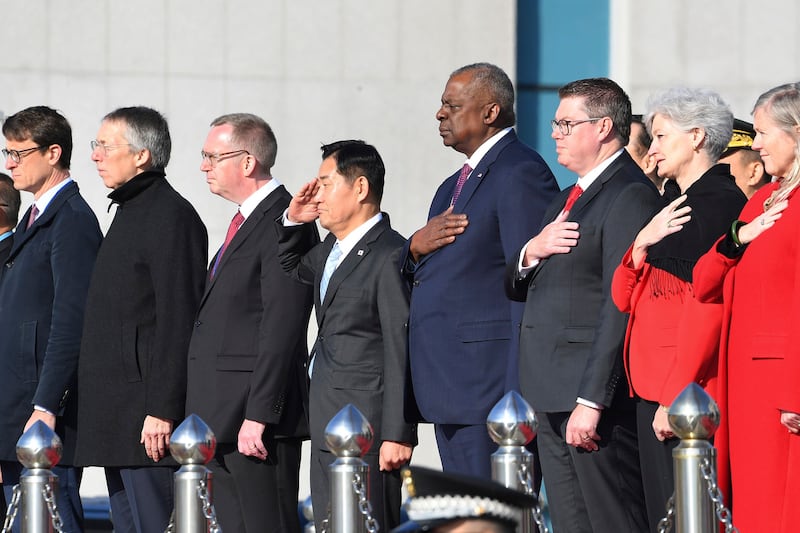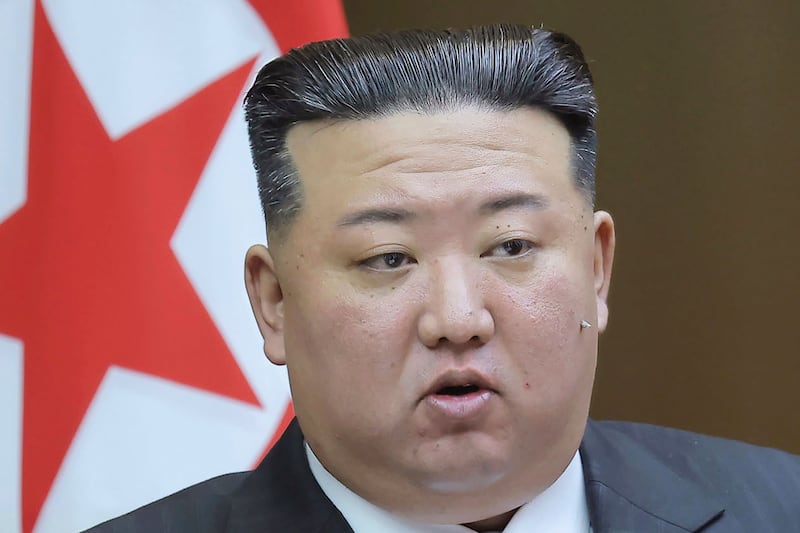NORTH Korean leader Kim Jong Un has boarded his private train and headed back to Pyongyang after directing some harsh criticism at Washington during his first summit with Russian President Vladimir Putin.
Mr Kim said the US negotiated in "bad faith" when he met with President Donald Trump in Hanoi two months ago.
Mr Kim left about four and a half hours earlier than planned, Russian news agencies reported.
It was not immediately known why he decided to return from Vladivostok early.
Mr Putin, who indicated he may be interested in playing a bigger role in breaking North Korea's stand-off with Washington, had already left for a two-day meeting in Beijing.
The Kremlin intends to brief the US on the contents of the summit as soon as the Russian delegation returns to Moscow, deputy foreign minister Sergei Ryabkov told the RIA Novosti news agency.
Mr Putin said he will also brief Chinese leaders on his talks with Mr Kim.
Before leaving Vladivostok, Mr Kim visited a park near the headquarters of the Russian navy's Pacific Fleet for a wreath-laying ceremony that was held two hours later than expected.
Mr Kim also had lunch with the local governor and businessmen and women on the outskirts of town before going to the main railway station.
Following their talks on Thursday, Mr Putin said Mr Kim is willing to give up nuclear weapons, but only if he gets ironclad security guarantees supported by a multi-national agreement.
Mr Kim strongly criticised Washington for taking a "unilateral attitude in bad faith" at his February meeting with Mr Trump in Hanoi said that caused the diplomatic standstill, North Korea's state-run Korean Central News Agency said on Friday.
He also told Mr Putin the situation on the Korean Peninsula has reached a "critical point" and whether tensions resume will "entirely depend on the US future attitude".
The agency said Mr Putin credited Mr Kim's diplomatic initiatives for stabilising the situation surrounding the peninsula and accepted Mr Kim's invitation to visit North Korea at a "convenient time".
No specific measures from the summit have been reported by either side and the leaders' comments suggest there has been no significant shift in Mr Kim's basic position.
North Korea has all along contended that it needs its nuclear arsenal to defend itself against what it sees as US hostility and wants concrete reassurances of its safety – including the removal of the American nuclear threat as an integral part of the denuclearisation of the entire Korean Peninsula.
Mr Trump has voiced hope that Mr Putin's involvement could help his efforts to get Kim to abandon his nuclear arsenal.
But it could also complicate matters, since Moscow has been critical of sanctions on North Korea and has called on Washington to provide more security guarantees.
After Thursday's talks, Mr Putin suggested the revival of a multilateral approach to the denuclearisation negotiations.
A similar approach, which Russia participated in, broke down in 2009.
Along with a statement of political support, Mr Kim was also looking for some kind of economic support and possibly even a workaround for sanctions that will require more than 10,000 North Korean labourers in Russia to leave by the end of the year.
The labourers are a major source of income for North Korea.
Mr Putin said they discussed the issue and would find a solution taking into account "humanitarian" factors, though he did not say what that would be.
Motorists in the Russian port city breathed a sigh of relief at Mr Kim's departure.
Traffic in the city of half a million had been severely disrupted since Mr Kim's arrival on Tuesday.
Just like two days earlier, traffic was completely blocked in the city centre during the send-off ceremony for Mr Kim.
Meanwhile German carmaker Daimler, which makes armoured limousines used by Kim Jong Un, has said it has no idea where he got them and has no business dealings with the North.
Mr Kim has raised eyebrows by using Daimler-branded stretch limousines at several very high-profile summits, including his meeting this week with Mr Putin and both of his earlier summits with President Trump.
The sale of luxury goods, including limousines, is banned under UN sanctions intended to put pressure on North Korea to abandon its nuclear weapons.
Mr Kim nevertheless had two limos waiting for him at Vladivostok station, a Mercedes Maybach S600 Pullman Guard and a Mercedes Maybach S62.
He is believed to have also used the S600 Pullman Guard for his summits with Mr Trump in Singapore in June last year and in Hanoi in February.
"We have absolutely no idea how those vehicles were delivered to North Korea," Daimler spokeswoman Silke Mockert said.
"For Daimler, the correct export of products in conformance with the law is a fundamental principle of responsible entrepreneurial activity."
Daimler, based in Stuttgart, Germany, is one of the world's biggest and more prestigious car companies.
It is one of the biggest providers of high-end passenger cars and the world's largest producer of lorries above six tons.
On its home page, the multinational giant boasts of selling vehicles and services in nearly all the countries of the world and of having production facilities in Europe, North and South America, Asia and Africa.
North Korea, however, is not one of its official customers.
"Our company has had no business connections with North Korea for far more than 15 years now and strictly complies with EU and US embargoes," she said.
"To prevent deliveries to North Korea and to any of its embassies worldwide, Daimler has implemented a comprehensive export control process.
"Sales of vehicles by third parties, especially of used vehicles, are beyond our control and responsibility."
Mr Kim's ability to procure the limousines anyway is a good example of how porous the international sanctions tend to be.
According to Daimler, the Mercedes-Benz Pullman limousines offer their passengers "a superbly appointed setting for discreet meetings".
The version used by Mr Kim is believed to be equipped with all the key communications and entertainment systems so that, according to a company description of the car, its occupants can remain "fully in touch with the rest of the world while enjoying the luxury and comfort of their own very special place in it".







